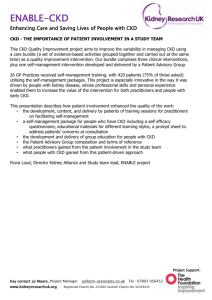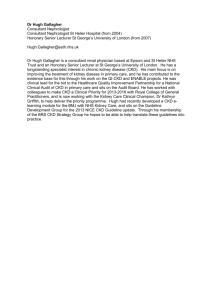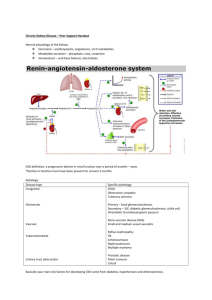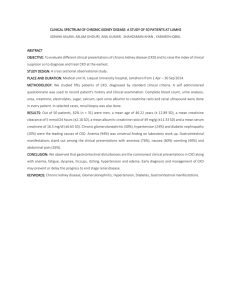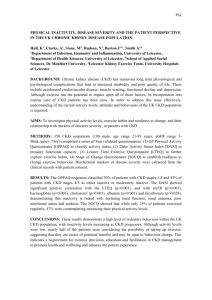Use of stage-specific codes for chronic kidney disease in
advertisement
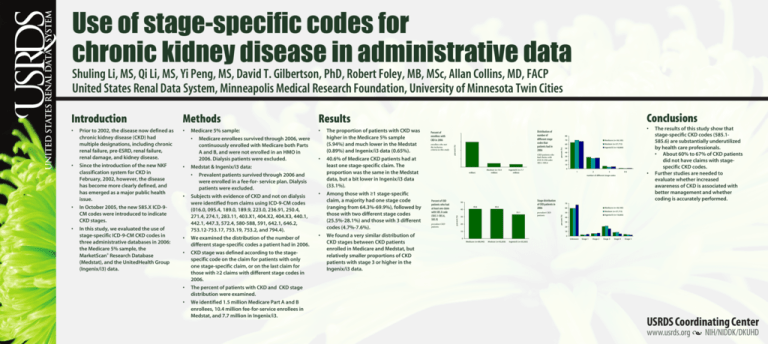
Use of stage-specific codes for chronic kidney disease in administrative data Shuling Li, MS, Qi Li, MS, Yi Peng, MS, David T. Gilbertson, PhD, Robert Foley, MB, MSc, Allan Collins, MD, FACP United States Renal Data System, Minneapolis Medical Research Foundation, University of Minnesota Twin Cities • • • • • Prior to 2002, the disease now defined as chronic kidney disease (CKD) had multiple designations, including chronic renal failure, pre-ESRD, renal failure, renal damage, and kidney disease. Since the introduction of the new NKF classification system for CKD in February, 2002, however, the disease has become more clearly defined, and has emerged as a major public health issue. In October 2005, the new 585.X ICD-9CM codes were introduced to indicate CKD stages. In this study, we evaluated the use of stage-specific ICD-9-CM CKD codes in three administrative databases in 2006: the Medicare 5% sample, the MarketScan® Research Database (Medstat), and the UnitedHealth Group (Ingenix/i3) data. • • • • • • Medicare 5% sample: • Medicare enrollees survived through 2006, were continuously enrolled with Medicare both Parts A and B, and were not enrolled in an HMO in 2006. Dialysis patients were excluded. Medstat & Ingenix/i3 data: • Prevalent patients survived through 2006 and were enrolled in a fee-for- service plan. Dialysis patients were excluded. Subjects with evidence of CKD and not on dialysis were identified from claims using ICD-9-CM codes (016.0, 095.4, 189.0, 189.9, 223.0, 236.91, 250.4, 271.4, 274.1, 283.11, 403.X1, 404.X2, 404.X3, 440.1, 442.1, 447.3, 572.4, 580-588, 591, 642.1, 646.2, 753.12-753.17, 753.19, 753.2, and 794.4). We examined the distribution of the number of different stage-specific codes a patient had in 2006. CKD stage was defined according to the stagespecific code on the claim for patients with only one stage-specific claim, or on the last claim for those with 2 claims with different stage codes in 2006. The percent of patients with CKD and CKD stage distribution were examined. We identified 1.5 million Medicare Part A and B enrollees, 10.4 million fee-for-service enrollees in Medstat, and 7.7 million in Ingenix/i3. • • • The proportion of patients with CKD was higher in the Medicare 5% sample (5.94%) and much lower in the Medstat (0.89%) and Ingenix/i3 data (0.65%). 40.6% of Medicare CKD patients had at least one stage-specific claim. The proportion was the same in the Medstat data, but a bit lower in Ingenix/i3 data (33.1%). Among those with 1 stage-specific claim, a majority had one stage code (ranging from 64.3%-69.9%), followed by those with two different stage codes (25.5%-28.1%) and those with 3 different codes (4.7%-7.6%). We found a very similar distribution of CKD stages between CKD patients enrolled in Medicare and Medstat, but relatively smaller proportions of CKD patients with stage 3 or higher in the Ingenix/i3 data. Distribution of number of different stage codes that patients had in 2006 Percent of enrollees with CKD in 2006 enrollees who met the inclusion criteria in this study CKD patients who had claims with ICD-9-CM codes 585.1-585.6 million) Medstat (n=10.4 million) • 80 percent (%) • Conclusions 70 Medicare (n=36,185) 60 Medstat (n=37,715) 50 Ingenix/i3 (n=16,666) 40 30 20 10 0 Ingenix/I3 (n=7.7 million) 1 2 3 4-6 number of different stage codes Percent of CKD patients who had at least one claim with 585.X code (585.1-585.6, 585.9) prevalent CKD patients Stage distribution of CKD patients in 2006 50 40.6 40.6 40 33.1 30 20 prevalent CKD patients • The results of this study show that stage-specific CKD codes (585.1585.6) are substantially underutilized by health care professionals. • About 60% to 67% of CKD patients did not have claims with stagespecific CKD codes. Further studies are needed to evaluate whether increased awareness of CKD is associated with better management and whether coding is accurately performed. 70 Medicare (n=36,185) 60 Medstat (n=37,715) 50 percent (%) Results percent (%) Methods percent (%) Introduction Ingenix/i3 (n=16,666) 40 30 20 10 10 0 0 Unknown Medicare (n=89,040) Medstat (n=92,838) Stage 1 Stage 2 Stage 3 Stage 4 Stage 5 Ingenix/I3 (n=50,365) USRDS Coordinating Center www.usrds.org • NIH/NIDDK/DKUHD

